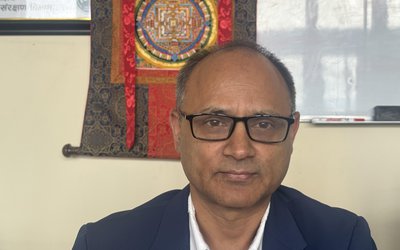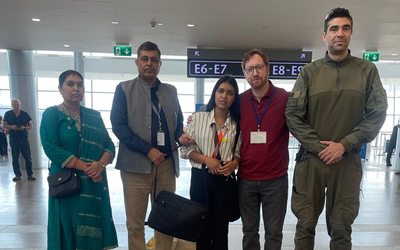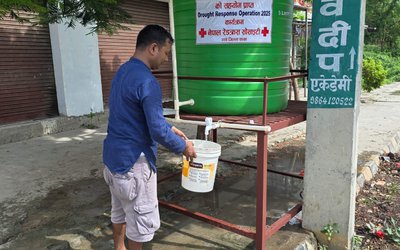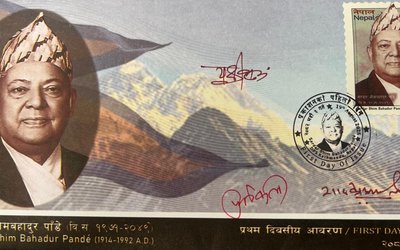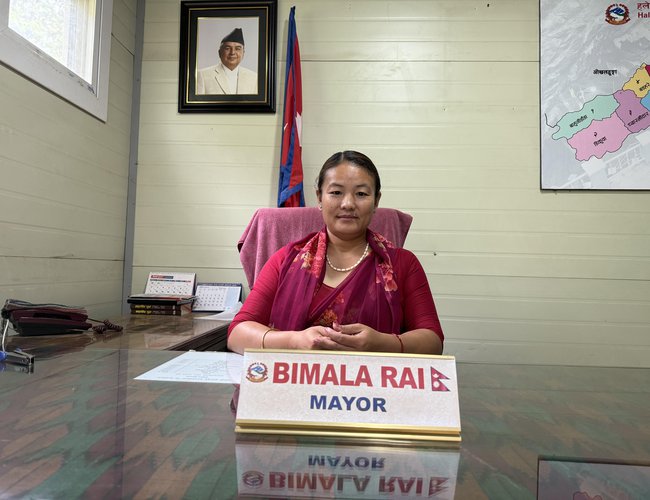
BIMALA RAI, the Mayor of Halesi-Tuwachung Municipality in Khotang District of Koshi Province, boldly presented the annual budget, policies, and programs for Fiscal Year 2025/026. With an estimated annual budget of Rs. 900 million, Rai also announced the promotion of Electricity and Renewable Energy for household cooking, lift irrigation, and drinking water. Following the receipt of the Municipal Energy Plan (MEP) in February, Mayor Rai has proposed the implementation of programs through annual policy and budget. In an interview with New Spotlight, Mayor Rai discussed various issues concerning the municipality's needs and her perspectives on energy matters.
What are your thoughts on the budget for income and expenditure that was recently presented at the 17th municipal council session for the fiscal year 2082/2083?
Halesi Tuwachung Municipality is a region known for its Hindu, Buddhist, and Kirat Mundhum spiritual traditions. The area has great potential for tourism and related industries, with over 700,000 tourists visiting last year and an expected increase to a million in the upcoming year. To boost the local economy through tourism, I am focusing on promoting indigenous agricultural products such as millet, corn, Gahat dal, and lentils. Additionally, I am working on branding local products like millet whisky, hems cloth, dairy products, and leaf plates to create employment opportunities and protect the environment. Efforts are also being made to reduce reliance on LPG and firewood by transitioning to electricity and renewable energy sources, including the use of solar pump sets for lift irrigation and drinking water supply.
What are your views on the new budget and its priorities?
In accordance with the Constitution of Nepal and the Local Government Act 2075, I presented the budget for the fiscal year 2082/083 to the Municipal Assembly on June 19. I am pleased to announce that the assembly approved the budget and policy and program on July 5. The budget addresses various needs of our municipality, with a focus on promoting economic growth in Halesi Tuwachung and preventing youth migration. The Municipal Assembly also approved the Policy and action plan for the upcoming fiscal year 2082/083. Our budget and policies prioritize the energy sector with allocated funds, marking a significant shift.
What are the main challenges faced by people?
The municipality is grappling with scarcity of drinking water and irrigation, which are the two primary issues. Despite being one of the largest municipalities in the hill region of Koshi Province, formed by the merger of eight former Village Development Committees, we face a water deficit. Even though our areas are surrounded by the Dudh Koshi and Sunkoshi rivers, which are the main tributaries of the Koshi, we receive minimal rainfall due to being in a rain shadow area. This has led to a lack of perennial groundwater sources, leaving us with limited options. One potential solution is to lift water from the Dudhkoshi and Sunkoshi rivers using solar pumps. A technical study has recently been completed with support from AEPC, and the municipality is now awaiting the detailed study report. Once we have the report, we will seek funding for technical assistance.
Halesi-Tuwachung Municipality approved the Municipal Energy Plan (MEP) in February. Have you proposed programs and a budget for its implementation?
Yes, I have proposed expanding electricity connections to cover the remaining 20 percent of households. Furthermore, I have suggested starting the Kurale Lipat lift drinking water and irrigation project with an allocated budget of Rs. 17 million. I am seeking technical support from the Renewable Energy and Energy Efficiency Program – Green Recovery and Empowerment with Energy in Nepal (REEEP-GREEN) for the construction of these projects. Collaboration with relevant organizations and the private sector will be key in promoting renewable energy development to reduce reliance on LPG and firewood for a greener environment.
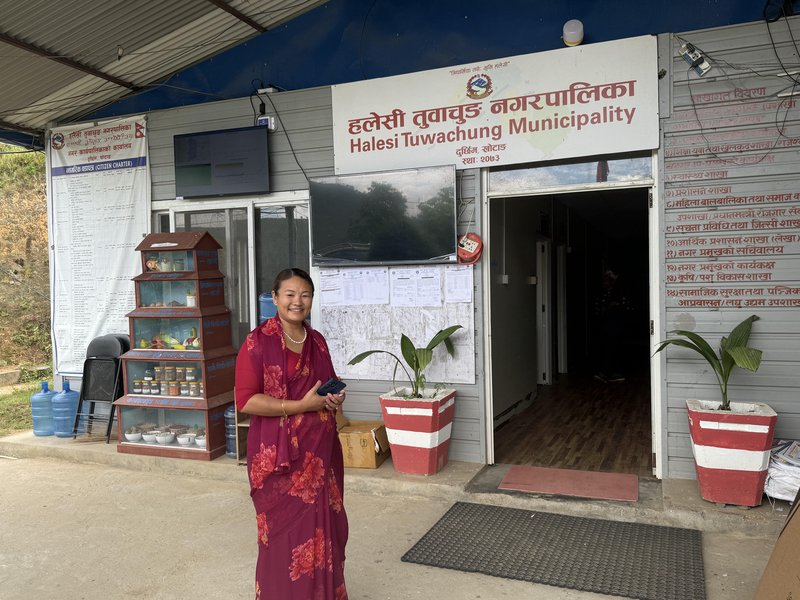
How do you view the technical assistance provided by REEEP-GREEN in the development of the MEP?
The technical assistance provided by REEEP-GREEN was invaluable to us. The program, co-funded by the European Union and the Federal Republic of Germany, offered comprehensive support to the municipality in drafting the MEP. The Alternative Energy Promotion Center (AEPC) also provided technical assistance to the Energy Subcommittee and worked closely with us. A delegation from the European Union, giz, and AEPC visited our municipality to hand over the MEP, and we are now focused on implementing the plan.
What inspired you during the drafting process?
One of the key takeaways was gaining a broader understanding of the various sources of energy and their impact on the economy. Previously, we only viewed electricity as energy, but through the MEP process, our municipal members realized that energy encompasses a wide range of elements. We also discovered how energy can positively impact the lives of women, marginalized groups, and indigenous communities. As an indigenous woman, I am aware of the significant role women play in the energy sector. Through the MEP process, we gained valuable insights. Additionally, we learned about the importance of women in energy consumption. Previously, we only considered household electrification through NEA's grid as energy, without understanding renewable energy's potential for water pumping and irrigation. Initially, we viewed LPG as a clean energy due to its lack of visible smoke during cooking. Our perception of energy has since evolved, thanks to the support and guidance from the EU and giz representatives in expanding our knowledge. REEEP-GREEN has been instrumental in this learning process.
How is the budget for the fiscal year 2082/083?
Out of a total budget of 800.1 million, only 16.5 million comes from internal sources. The municipality will need to rely on grants from the federal and provincial governments. However, the necessary budget will be secured, and efforts will be made in the upcoming fiscal year to expand irrigation areas and improve drinking water supply in collaboration with consumers and the private sector. Solar technology is being considered for irrigation in the areas of Bhadbesi, Ladkuwa, Rupatar, Kuler, Haide, Damdle, and Lalshiftung within the Koshi corridor area of the municipality.
Nepal has already committed to achieving zero emissions by 2045 and reducing LPG usage by half by 2030. How do you plan to meet these goals?
The distribution of electric stoves and improved stoves will be carried out through cost-sharing arrangements. The municipality will work with federal and provincial governments, development partners, and the private sector to implement the MEP's recommendations on energy use. The installation of solar lights in major roads and densely populated areas will continue. The municipality will promote renewable energies and energy efficiency for economic development, aiming to reduce emissions. Efforts will be made to support women and disadvantaged groups in participating in energy-related decision-making processes. We are currently seeking budget support from the federal and provincial governments to advance clean cooking, expand irrigation areas, and improve drinking water supply. These programs will be implemented in partnership with consumers, the private sector, and development partners such as the EU and giz.
- Bipin Joshi’s Family Visit to Israel
- Aug 21, 2025
- The European Union Provides humanitarian funding To Those Impacted by Drought In Nepal
- Aug 21, 2025
- Nepal Claims Kalapani Region Including Lipulek Integral Part Of Its Territory, India Rejected The Stand
- Aug 21, 2025
- Prime Minister to visit China Before India
- Aug 21, 2025
- Weather Forecast: Generally Cloudy Across The Hilly Areas of Nepal With Moderate Rain Is Likely To Occur In Koshi, Bagmati Amd Gandaki Provinces
- Aug 21, 2025
